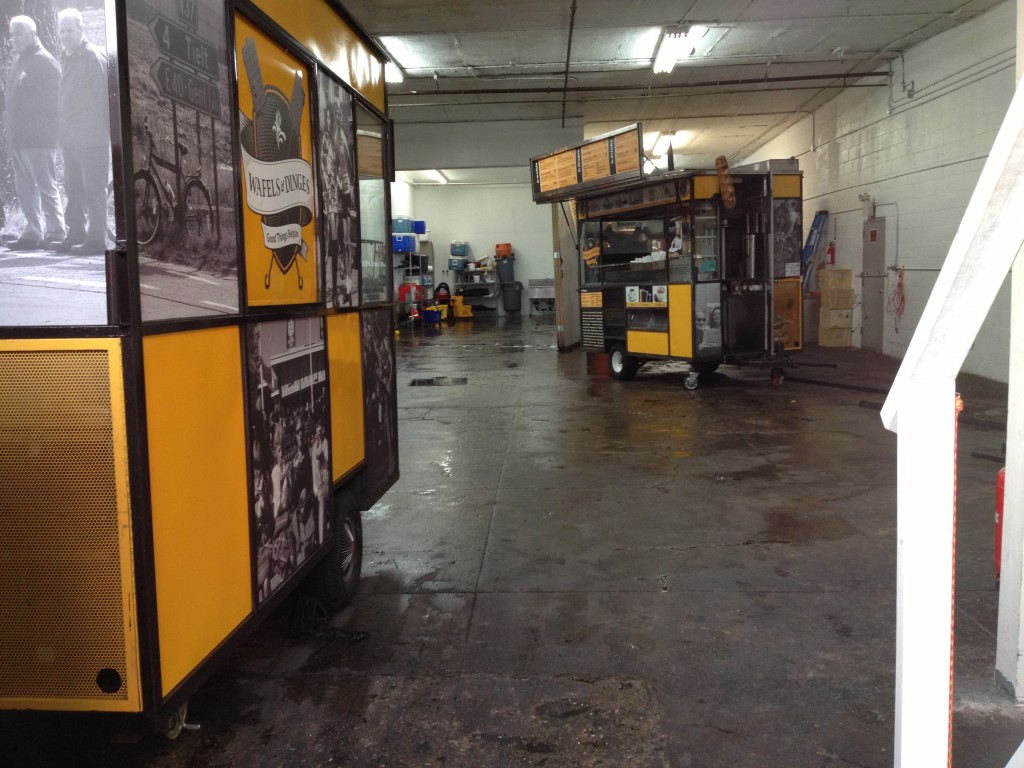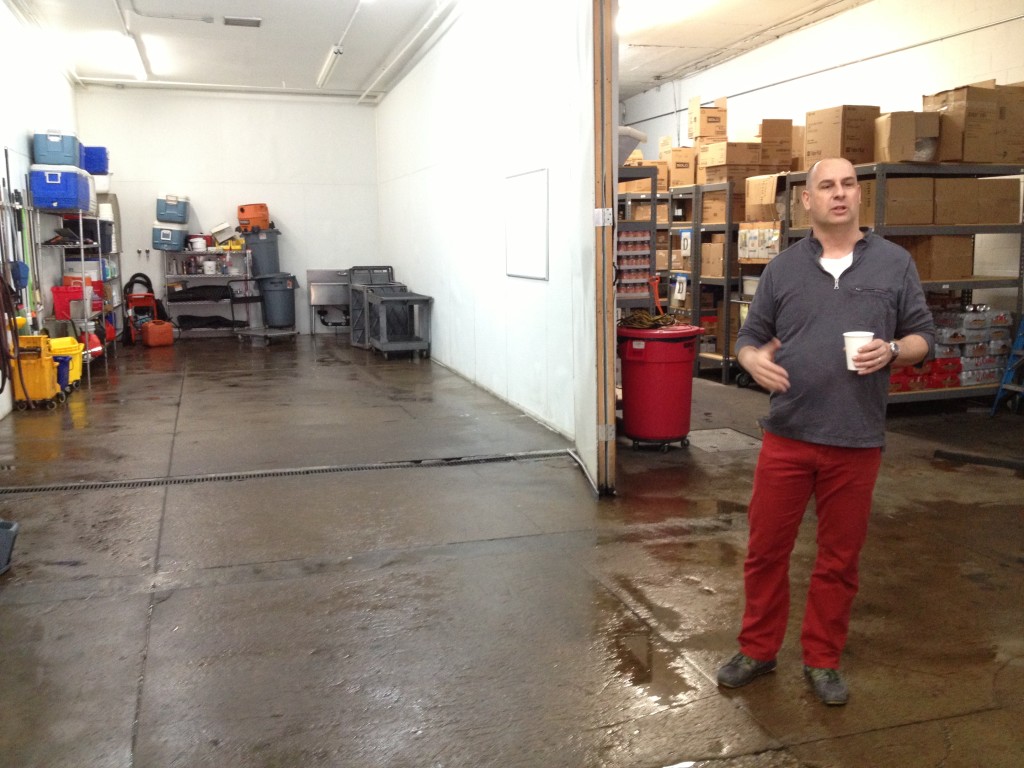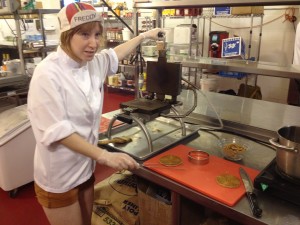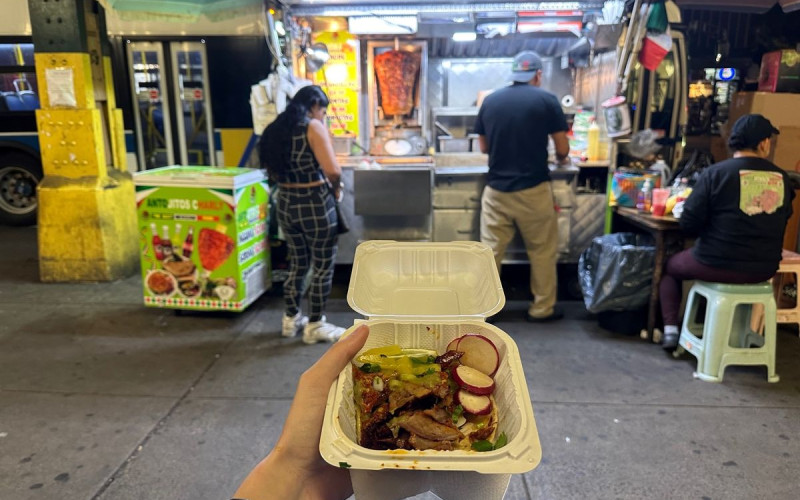One of the amazing things about mobile food vendors is how much they are able to cram into a tiny curbside kitchen – they’re bristling with compartments meticulously arranged to deliver and often complex menu to customers quickly and efficiently.
But what you see on the street is often only a fraction of the operation.
Earlier this month, we had the opportunity to visit de Royal Dinges Factory, home base of Wafels & Dinges, who’s unmistakable fleet of bright yellow food carts and trucks can spotted all over the city. They are a featured stop on almost all of our Food Cart Tours of Midtown and the Financial District, and they have been a great partner over the years. Company founder Thomas DeGeest and manager Sophie Grant led me and some other food writers on a tour of their commissary and kitchen, located in Gowanus, Brooklyn, where we got to see how the dinges gets made, so to speak.
Wafels & Dinges was started by DeGeest in his living room in Chelsea back in 2007, with a converted Chevy truck and frozen waffle dough imported from Belgium. As the company grew, and he started using fresh-made ingredients, he needed to expand beyond his apartment. Every mobile food vendor in New York City is required by law to store their cart or truck every day at a city-licensed commissary, where they are cleaned, repaired, and often inspected. In addition, all food preparation must be done in a licensed commercial kitchen – many commissaries combine these operations in one place, offering kitchens, parking, and washing stations to their tenants. Wafels & Dinges had previously been in a Gowanus commissary that they shared with many other food vendors, but as the fleet grew – they now operate two trucks and five carts – they decided that they needed their own space. In addition to the convenience and efficiency this would provide, sharing a commissary with other vendors poses risks – if just one vendor fails an inspection, the entire commissary could be closed, sometimes for multiple days, leaving the other tenants scrambling to find a place to store their carts.
The Wafels & Dinges commissary and factory opened in 2010, and it has everything they need to keep their carts and trucks stocked, clean, and on the streets, including a washing station, office, decked-out kitchen, and even a small gift shop. Maintenance is a daily concern, and the wear-and-tear from being on the streets is substantial. Turning around a truck to get it ready for the next vending day can take up to eight hours, even if no major repair needs to be done. If it does, the commissary has a stock of spare equipment and parts, and as DeGeest says, “Anything broken can be fixed in two hours” (short of a transmission rebuild, of course). “It’s a bit like Daytona 500 tire changes” when a truck needs to be repaired, especially if it is in the middle of the day and they’re losing selling time.
The carts and trucks themselves are wonders, built by Shanghai Stainless in Brooklyn, the premier mobile food fabricator in the city. But making a waffles on a cart was new to them, so the design process took longer than it normally would for a cart serving halal food or tacos (read a fascinating article from the New York Times about Shanghai Stainless). Now, each new cart is outfitted with slight improvements to increase efficiency and shrink the motions required be the operator. Even things as simple as shifting where the coffee cup lids are stacked can shave seconds off an order and make the cart run more smoothly. But none of this attention to detail should come as a surprise – before he founded W&D, DeGeest was a management consultant for IBM.
Having a stable home base is critical for any food vendor, but so is finding reliable spots to sell, and if you want to grow, pushing into new markets. Finding a good spot involves locating a point crossed by multiple variables of neighborhood, time of day, day of the week, and precise location on the sidewalk. “Food trucks work on the microscopic knowledge of the street corner,” DeGeest said, and their fleet is always testing these variables to optimize their schedule. One strategy they’ve pursued is hitting college campuses earlier in the week, then going to office districts on Thursdays and Fridays. The reason? The corporate crowd tries to go to work early on Monday and Tuesday to make a good impression or get a jump on their work, and they don’t stop for waffles; by the end of the week, they’re burnt out and need a snack.
While you can find them in regular spots throughout Manhattan (with the help of their website and Twitter), they have also been moving into areas of Brooklyn and Queens less well-trafficked by street vendors. “We’re experts in going into uncharted territory,” DeGeest added. Where you won’t find the W&D carts anymore is on public sidewalks. New legislation has shaved down the amount of sidewalk space available to vendors, and they recently lost their well-known location at the Time Warner Center in Columbus Circle. Instead, all their carts operate on Parks Department property, which requires a special permit to vend from a specific location. Though the costs of these permits can be high for popular areas, they provide more stability than vending on the sidewalk, where there are no assigned spots.
I would be remiss if I did not mention Wafels & Dinges’ friendly, capable staff, who have been a pleasure to work with over the years. To run a fleet of carts and trucks, a kitchen, and a garage, they employ 40-60 people, depending on the season, and have a low rate of turnover, a rarity in the food service industry. They invest in their people, and the training to run one of their carts is rigorous – learning to operate a cart solo can take up to three months, while mastering the complexity of managing one of their trucks can require up to 18 months.
Oh, and did I mention the food? We got the chance to step into their kitchen, where W&D chef’s are constantly tweaking recipes and concocting new menu items. Their current menu only has one savory dish – a waffle with pulled pork, which is only available on the trucks – but that will soon change. We tasted their new de Bastogne wafel, a potato waffel filled with dill and bacon, served with a fruit-based syrop de liege and sour cream (but with no NUTS!, which is what many Americans know Bastogne for, sort of).
And soon Wafels & Dinges will have another home base beyond the commissary. Later this year, they will be opening a café in Manhattan’s East Village, located on Avenue B and East 2nd Street, where they will be serving up their waffles, as well as coffe from Brooklyn Roasting Company, and ice cream by Mont Blanc Dessert. The Bastogne wafel will be joined by a new stroop wafel, a thin, wafer-like confection filled with sweet apple filling (full disclosure: I took several of these home with me). We also tried their spekuloos milkshake, made from the same spice cookie that they make into their famous spread (the best kind of dinges) and ice cream.
The café isn’t just an opportunity to offer new menu items, but to move the company in a new direction. Building a company around food trucks in multiple cities is a major challenge that few have pulled off, due to the wild variations in regulations from city to city. “How can we take the reach of Wafels & Dinges and push it out into other states?” DeGeest wonders. “To run a complex operation like [this], I don’t see it happening with food trucks.” But the cafés could be coming to other cities in the future.
To DeGeest, the most important thing is keep your eye on what is important, namely a quality product and people. He admires California’s famed In-N-Out Burger, which has achieved tremendous success without franchising or going public, and it has “kept its soul.”
“[The waffle] is a technical product. The moment you dumb it down, you lose it,” DeGeest says.
Grant adds, “Waffling is an art. You have to put love into the waffle.”
The Royal Dinges Factory is located on Butler Street in Gowanus, Brooklyn, and is open for tours on Saturdays by appointment – contact dinges@dedinges.com to arrange a tour and visit their website for more information. And stop by de Wafels & Dinges Café when it opens in the coming weeks, located at 15 Avenue B in Manhattan.
Turnstile Tours offers weekly tours of food carts and trucks year-round, every Wednesday at 12pm in Manhattan’s Financial District, and every Friday at 2pm in Midtown. These tours include tastings from six different vendors, and visitors learn about the history of vending in New York City, the rules and regulations affecting vendors, and they even have the opportunity to meet the vendors themselves and ask about what it takes to run one of these small businesses. At least 5% of all of our ticket sales goes to support the Street Vendor Project. To join us, visit our tickets and information page.










